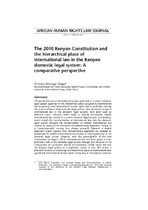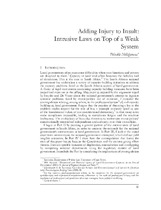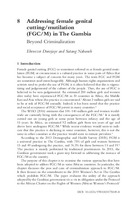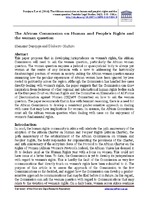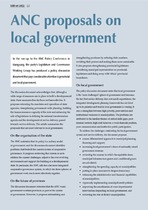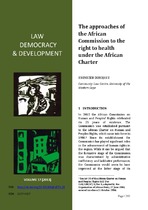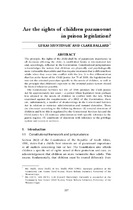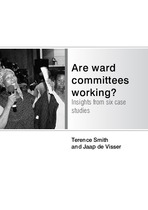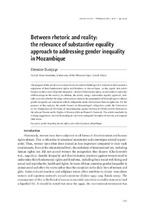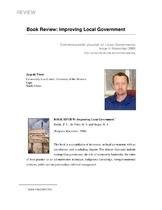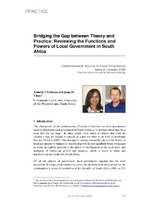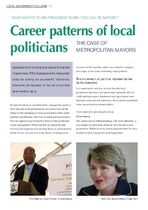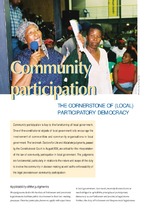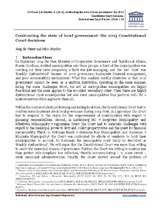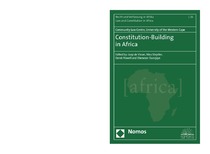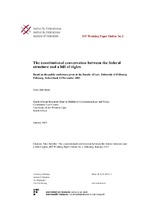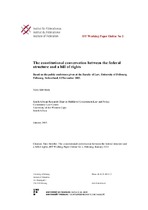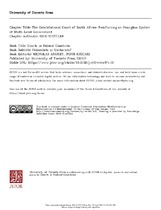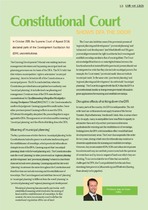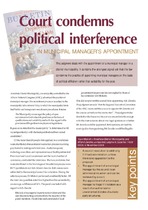Browsing Research Articles - Dullah Omar Institute by Title
Now showing items 1-20 of 144
-
The 2010 Kenyan constitution and the hierarchical place of international law in the Kenyan domestic legal system: a comparative perspective
(Pretoria University Law Press (PULP), 2013)The prominent use of international human rights law in a state’s domestic legal system depends on the hierarchical place occupied by international law in general, and international human rights law in particular, among the ... -
Adding injury to insult: Intrusive laws on top of a weak system
(Constitutional Court Review, 2016)Local governments often encounter difficulties when state functions and powers are devolved to them. Capacity at local level often becomes the Achilles heel of devolution. This is the case in South Africa. The South African ... -
Addressing female genital cutting/mutilation (FGC/M) in The Gambia
(Routledge, 2021)The purpose of this chapter is to examine the viability of the use of criminal sanction to address FGC/M in general. It then examines the nexus between FCG/M and human rights and discusses the reasons often adduced to ... -
The African Commission on Human and People's Rights and the woman question
(Springer, 2016)This paper proposes that in developing jurisprudence on women's rights, the African Commission will need to ask the woman question particularly the African woman question. The woman question requires a judicial or ... -
ANC proposals on local government
(Community Law Centre, University of the Western Cape, 2012)In the run up to the ANC Policy Conference in Mangaung, the party's Legislature and Governance Working Group has produced a policy discussion document that pays considerable attention to provincial and local government. -
The approaches of the African Commission to the right to health under the African Charter
(Faculty of Law, University of the Western Cape, 2013)In 2012 the African Commission on Human and Peoples' Rights celebrated its 25 years of existence. The Commission was established pursuant to the African Charter on Human and Peoples Rights, which came into force in 1986. ... -
Are the rights of children paramount in prison legislation?
(Juta Law, 2013)The principle, the rights of the child shall be of paramount importance in all decisions affecting the child, is established firmly in international law and, accordingly, reflected in the Constitution. Constitutional ... -
Are ward committees working? Insights from six case studies
(Community Law Centre, University of the Western Cape, 2009)The research presented in this book sets out to offer a deeper and more nuanced understanding of the functioning and value of ward committees. In-depth qualitative studies of six ward committees are described. They provide ... -
Between rhetoric and reality: the relevance of substantive equality approach to addressing gender inequality in Mozambique
(GAP, 2017)The purpose of this article is to examine the socio-cultural challenges that continue to limit women’s enjoyment of their fundamental rights and freedoms in Mozambique. In this regard, this article focuses on three areas ... -
Book Review: Improving local government
(Commonwealth Journal of Local Governance, 2009)Academic literature that engages in a comparison of local government systems, policies and practices and their impact on democracy and development is hard to come by. Yet, these comparisons are critical as they shed light ... -
Bridging the gap between theory and practice: Reviewing the functions and powers of local government in South Africa
(Commonwealth Journal of Local Governance, 2009)The purpose of this practice note to evaluate the current allocation of functions and powers in the Constitution, and furthermore to propose a set of criteria to guide decisions on where powers and functions are best ... -
Career patterns of local politicians: The case of metropolitan mayors
(Community Law Centre, University of the Western Cape, 2006)Local government is emerging as a strong third sphere of government. Within local government, metropolitan cities are coming out as powerful institutions. Meanwhile, the discussion on the role of provincial governments is ... -
Community participation: The cornerstone of (local) participatory democracy
(Community Law Centre, University of the Western Cape, 2007)Community participation is key to the functioning of local government. One of the constitutional objects of local government is to encourage the involvement of communities and community organisations in local government. ... -
Confronting the state of local government: the 2013 Constitutional Court decisions
(Juta, 2016)In September 2014 the then Minister of Cooperative Governance and Traditional Affairs, Pravin Gordhan, divided municipalities into three groups: a third of the municipalities was carrying out their tasks adequately, a third ... -
Constitution-Building in Africa
(Community Law Centre, University of the Western Cape, 2015)The process towards the adoption of a constitution is determined by the context in which the constitution is written. It navigates such issues as political engagement, keeping politically agreed timelines, ensuring the ... -
The constitutional conversation between the federal structure and a bill of rights
(Community Law Centre, University of the Western Cape, 2015-01)It is often assumed that a constitution speaks with one voice and that all parts are in harmony with each other. Although different provisions can be given higher status than others (as reflected in the more arduous amendment ... -
The constitutional conversation between the federal structure and a bill of rights
(Institute of Federalism, University of Fribourg, 2015-01)It is often assumed that a constitution speaks with one voice and that all parts are in harmony with each other. Although different provisions can be given higher status than others (as reflected in the more arduous amendment ... -
The Constitutional Court of South Africa: Reinforcing an hourglass system of multi-level government
(University of Toronto Press, 2017)“The supremacy of the constitution and the rule of law” are two foundational values of South Africa’s 1996 Constitution (s. 1(c)). An independent judiciary is thus set to play a major role in interpreting and enforcing ... -
Constitutional Court shows DFA the door
(Community Law Centre, University of the Western Cape, 2010)In October 2009, the Supreme Court of Appeal (SCA) declared parts of the Development Facilitation Act (DFA) unconstitutional. The Gauteng Development Tribunal was making land use management decisions and bypassing municipal ... -
Court condemns political interference in municipal manager's appointment
(Community Law Centre, University of the Western Cape, 2009)Amathole District Municipality, a municipality controlled by the African National Congress (ANC), advertised the position of municipal manager. The recruitment process was subject to the municipality’s Recruitment Policy, ...

